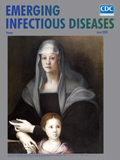
Volume 26, Number 6—June 2020
Research Letter
Indirect Virus Transmission in Cluster of COVID-19 Cases, Wenzhou, China, 2020
On This Page
Figures
Downloads
Altmetric
Abstract
To determine possible modes of virus transmission, we investigated a cluster of coronavirus disease cases associated with a shopping mall in Wenzhou, China. Data indicated that indirect transmission of the causative virus occurred, perhaps resulting from virus contamination of common objects, virus aerosolization in a confined space, or spread from asymptomatic infected persons.
Severe acute respiratory syndrome coronavirus 2 (SARS-CoV-2), the causative agent of coronavirus disease (COVID-19), is presumed to spread primarily via respiratory droplets and close contact. However, these transmission modes do not explain all cases. To determine how the virus may have spread among a cluster of COVID-19 cases associated with a shopping mall in Wenzhou (a city with 8 million residents), China, we monitored and traced close contacts and hypothesized possible transmission modes. We analyzed clinical and laboratory data for cases by using real-time reverse transcription PCR (1). The study was approved with written consent from the Ethics Committee of Wenzhou Central Hospital and written informed consent from all case-patients.





















.png)












No hay comentarios:
Publicar un comentario